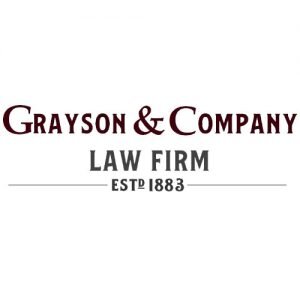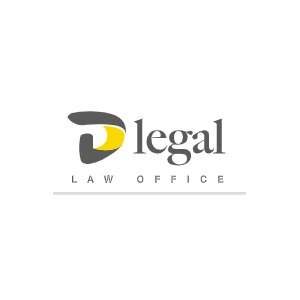Best Investment Lawyers in Canada
Share your needs with us, get contacted by law firms.
Free. Takes 2 min.
Or refine your search by selecting a city:
List of the best lawyers in Canada
About Investment Law in Canada
Investment law in Canada encompasses a variety of legal disciplines that involve the regulation of financial transactions and the protection of investors. The Canadian financial market offers diverse opportunities, including stocks, bonds, real estate, and mutual funds. The investment landscape is governed by a combination of federal, provincial, and territorial regulations, ensuring transparency, fairness, and the protection of participants. Key bodies such as the Canada Securities Administrators (CSA) and the Investment Industry Regulatory Organization of Canada (IIROC) play crucial roles in overseeing and regulating investment practices.
Why You May Need a Lawyer
There are numerous situations in which you might require the assistance of a lawyer for investment matters in Canada:
- Understanding complex investment agreements and documentation.
- Assessing investment risks and regulatory compliance.
- Representation in disputes, such as shareholder disagreements or fraud allegations.
- Guidance on mergers and acquisitions, especially cross-border transactions.
- Protection of intellectual property when investing in technology sectors.
- Navigating the tax implications of different investment strategies.
Legal guidance ensures that you are making informed decisions, protecting your rights, and complying with the law.
Local Laws Overview
Investment laws in Canada are multifaceted and vary by region due to the country's federal structure. Key aspects include:
- Securities Legislation: Each province and territory has its own securities regulator, though they collaborate through the CSA to harmonize regulations and policies.
- Foreign Investment: The Investment Canada Act governs foreign investment, requiring certain investments to be reviewed to ensure they are beneficial to Canada.
- Banking and Financial Services: Governed by the Bank Act and other regulations that ensure the stability and integrity of financial institutions.
- Anti-Money Laundering (AML): Laws aimed at preventing the exploitation of the financial system for money laundering and terrorism financing.
- Taxation: Managed by the Canada Revenue Agency, imposing taxes on earnings from investments and capital gains.
Frequently Asked Questions
What are the popular investment options in Canada?
Common investment options include stocks, bonds, mutual funds, Exchange-Traded Funds (ETFs), real estate, and commodities.
How are foreign investments regulated in Canada?
Foreign investments are mainly regulated under the Investment Canada Act, which reviews significant investments to ensure they are in the country’s best interests.
What is the role of the Canada Securities Administrators (CSA)?
The CSA is a national umbrella organization of provincial and territorial securities regulators responsible for improving, coordinating, and harmonizing the regulation of Canada’s capital markets.
Is there a legal framework for digital and cryptocurrency investments?
Yes, digital and cryptocurrency investments are subject to securities laws, anti-money laundering regulations, and tax obligations, with guidance from the CSA and other regulatory bodies.
Can I invest in Canadian companies as a non-resident?
Non-residents can invest in Canadian companies, but certain restrictions apply, especially when it comes to acquiring significant stakes or assets.
What taxes apply to investment income in Canada?
Investment income is generally taxed based on its source, such as interest, dividends, or capital gains, each with specific tax rates and exemptions.
How do I resolve disputes with an investment firm?
Disputes can be resolved through negotiation, mediation, arbitration, or by filing a complaint with regulatory bodies like IIROC or the Ombudsman for Banking Services and Investments (OBSI).
What protections are available for investors in Canada?
Investors are protected by securities laws that ensure transparency, disclosure, and enforcement against fraudulent activities. The Canadian Investor Protection Fund (CIPF) also safeguards client assets in case of member firm insolvency.
How do I know if an investment opportunity is fraudulent?
Signs of fraud include guaranteed profits, high-pressure sales tactics, lack of documentation, and complex or secretive investments. Always verify with recognized regulatory bodies and conduct due diligence.
Are there ethical and sustainable investment options available?
Yes, there is a growing market for ethical and sustainable investments, often referred to as Environmental, Social, and Governance (ESG) investments. Many funds and portfolios are designed to meet these criteria.
Additional Resources
Several resources are available to assist those seeking legal advice or information on investments in Canada:
- Canada Securities Administrators (CSA)
- Investment Industry Regulatory Organization of Canada (IIROC)
- Canadian Investor Protection Fund (CIPF)
- Ombudsman for Banking Services and Investments (OBSI)
- Canadian Department of Finance
- Local provincial and territorial securities commissions
Next Steps
If you need legal assistance for an investment matter, consider the following steps:
- Identify Your Needs: Determine the specific legal services you require, whether contract review, dispute resolution, or regulatory compliance.
- Research: Use resources like legal directories, provincial law societies, or referrals to find a specialized investment lawyer.
- Consultation: Schedule consultations with a few lawyers to discuss your case, their experience, and fee structures.
- Make a Decision: Choose a lawyer who has the expertise, a good track record, and with whom you feel comfortable working.
- Engagement: Once you've chosen a lawyer, formally engage their services and begin working on your investment legal matters.
Lawzana helps you find the best lawyers and law firms in Canada through a curated and pre-screened list of qualified legal professionals. Our platform offers rankings and detailed profiles of attorneys and law firms, allowing you to compare based on practice areas, including Investment, experience, and client feedback.
Each profile includes a description of the firm's areas of practice, client reviews, team members and partners, year of establishment, spoken languages, office locations, contact information, social media presence, and any published articles or resources. Most firms on our platform speak English and are experienced in both local and international legal matters.
Get a quote from top-rated law firms in Canada — quickly, securely, and without unnecessary hassle.
Disclaimer:
The information provided on this page is for general informational purposes only and does not constitute legal advice. While we strive to ensure the accuracy and relevance of the content, legal information may change over time, and interpretations of the law can vary. You should always consult with a qualified legal professional for advice specific to your situation.
We disclaim all liability for actions taken or not taken based on the content of this page. If you believe any information is incorrect or outdated, please contact us, and we will review and update it where appropriate.
Browse investment law firms by city in Canada
Refine your search by selecting a city.















